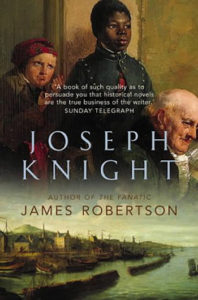
*On this date in 1778, the Justices of the Peace court in Perth, Scotland, ruled on the case of Knight v. Wedderburn. This Scottish slavery decision predated the very similar Dred Scott ruling in America.
Joseph Knight was an African slave of John Wedderburn of Scotland. Knight's legal challenge began in 1774 when he sought the freedom to leave the employment of John Wedderburn of Bandean in Perthshire. Knight claimed that, although many years earlier, he had been purchased by Wedderburn in Jamaica from a slave trader, the act of landing in Scotland freed him from perpetual servitude, as slavery was not recognized in Scotland. The Justices of the Peace were found in favor of Wedderburn. However, Knight appealed to the Sheriff of Perth, who found that 'the state of slavery is not recognized by the laws of this kingdom, and is inconsistent with the principles thereof: That the regulations in Jamaica, concerning slaves, do not extend to this kingdom; and repelled the defender's claim to a perpetual service'.
In 1777 Wedderburn appealed to the Court of Session in Edinburgh, Scotland's supreme civil court, arguing that Knight still owed perpetual service in the same manner as an indentured servant or an apprenticed artisan. The case was important enough that it was given a full panel of twelve judges, including Lord Kames, the important legal and social historian. Knight became aware of the ruling in the Sommersett Case in England, which held that slavery did not exist under English law.
Perhaps assuming (wrongly) that a ruling in an English court applied equally in Scotland, Knight demanded his freedom and even asked for back wages from his owner, which Wedderburn refused. Wedderburn was indignant, feeling that he had bestowed considerable gifts on Knight by educating him and taking care of him. Soon, Thompson was pregnant with Knight's child, and Wedderburn dismissed her, refusing Knight permission to go. When Wedderburn found Knight packing his bags to leave, he summoned the magistrate and had his slave arrested and thrown into Perth jail.
Knight managed to persuade John Swinton, the deputy sheriff at Perth Sheriff Court, that he was entitled to his freedom. Knight, therefore, brought a claim before the Justices of the Peace court in Perth, a case known as Knight v Wedderburn. Henry Dundas, the Lord Advocate of Scotland, represented a knight. James Boswell and Samuel Johnson also took a keen interest in Knight’s defense. Their argument was that 'no man is by nature the property of another.' Since there was no proof that Knight had given up his natural freedom, he should be set free. Conversely, Wedderburn's counsel argued that commercial interests, who underpinned Scotland's prosperity, should prevail.
In an unexpected decision, Lord Kames stated that 'we sit here to enforce right not to enforce wrong' and the court emphatically rejected Wedderburn's appeal, ruling by an 8 to 4 majority that: "The dominion assumed over this Negro, under the law of Jamaica, being unjust, could not be supported in this country to any extent: That, therefore, the defender had no right to the Negro’s service for any space of time, nor to send him out of the country against his consent: That the Negro was likewise protected under the act 1701, c. six from being sent out of the country against his consent." In effect, the Scots law did not recognize slavery, and runaway slaves (or 'perpetual servants') could be protected by the courts if they wished to leave domestic service or were resisting attempts to return them to slavery in the colonies.